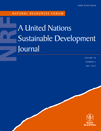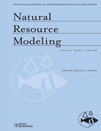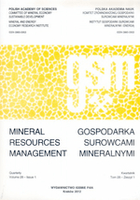
Natural Resources Research
Scope & Guideline
Elevating the dialogue on sustainable resource use and management.
Introduction
Aims and Scopes
- Geoscience and Mineral Exploration:
The journal emphasizes research on geological methodologies, mineral resource estimation, and the use of advanced technologies like machine learning and geostatistics for mineral prospectivity mapping. - Coal and Energy Resources:
There is a consistent focus on coal properties, including its mechanical behavior, gas adsorption characteristics, and methods for enhancing coalbed methane recovery. - Environmental Impact Assessment:
Research includes studies on the environmental implications of resource extraction, particularly concerning groundwater quality and the impacts of mining on ecosystems. - Hydrogeology and Groundwater Management:
The journal covers groundwater resource assessment, management techniques, and the integration of remote sensing and geophysical methods for groundwater exploration. - Innovative Modeling Techniques:
The use of advanced computational models, including AI and machine learning approaches, for predicting resource behavior and optimizing extraction processes is a key area of focus.
Trending and Emerging
- Machine Learning and AI Integration:
The application of machine learning techniques for mineral prospectivity mapping, resource estimation, and predictive modeling is increasingly prevalent, showcasing the journal's commitment to modern methodologies. - Environmental Sustainability and Resource Management:
There is a growing emphasis on sustainable practices in resource management, including studies on the environmental impacts of mining and strategies for ecological restoration. - Advanced Geophysical Techniques:
Innovative geophysical methods, such as integration of multi-source data and remote sensing technologies, are gaining attention for their effectiveness in resource exploration. - Data-Driven Decision Making:
Research focusing on data analytics and decision-making frameworks is on the rise, reflecting the industry's shift towards evidence-based resource management. - Interdisciplinary Approaches:
The trend towards interdisciplinary research that combines geoscience with environmental science, engineering, and data science is becoming more pronounced, highlighting the journal's broadening scope.
Declining or Waning
- Traditional Geological Surveys:
The reliance on conventional methods of geological surveys and assessments has diminished as the field increasingly adopts more sophisticated, data-driven approaches. - Basic Hydrocarbon Exploration Techniques:
Standard techniques for oil and gas exploration are being overshadowed by advanced modeling and simulation methodologies that offer greater accuracy and efficiency. - Focus on Fossil Fuels:
As the global energy landscape shifts towards renewable energy sources, the emphasis on fossil fuel research, particularly coal, is decreasing in favor of sustainable alternatives. - Static Reservoir Modeling:
There is a noticeable reduction in static modeling approaches as dynamic, real-time modeling techniques gain traction for their ability to adapt to changing conditions. - Localized Case Studies:
The journal has shifted from region-specific case studies to broader, integrative approaches that encompass multiple regions and methodologies.
Similar Journals

Applied Geophysics
Empowering Research Through Interdisciplinary CollaborationApplied Geophysics is a premier journal dedicated to the interdisciplinary study of geophysical processes and their applications across various domains, published by SPRINGER. With an ISSN of 1672-7975 and an E-ISSN of 1993-0658, this journal serves as a pivotal platform for researchers, professionals, and students to share their latest findings and insights in the field of geophysics. Operating from China, the journal has established itself within the Q3 quartile in Geophysics as of 2023, reflecting its commitment to high-quality research, even as it ranks #105 out of 165 in the Earth and Planetary Sciences category, placing it in the 36th percentile on Scopus rankings. This makes it an essential resource for advancing knowledge in geophysical methodologies and applications. While it operates in a traditional subscription model, its relevance and timeliness ensure it remains a crucial outlet for emerging scientific discussions. The journal particularly encourages the integration of practical applications with theoretical frameworks, fostering innovation in areas such as environmental geophysics, resource exploration, and hazard assessment.

Frontiers of Earth Science
Exploring the Depths of Earth and BeyondFrontiers of Earth Science is a prominent academic journal in the field of Earth and Planetary Sciences, published by Springer. With an ISSN of 2095-0195 and an E-ISSN of 2095-0209, this journal serves as a significant platform for researchers and professionals to disseminate their findings from 2007 to 2024. It is recognized for its impactful contributions within the category of Earth and Planetary Sciences, boasting a respected Q2 ranking in 2023. With a Scopus ranking of 64 out of 195, placing it in the 67th percentile, Frontiers of Earth Science continues to drive academic dialogue and innovation. The journal is dedicated to exploring a diverse range of topics, including geology, meteorology, and environmental science, and amplifying the understanding of Earth systems through rigorous research. Located in New York, USA, this journal embraces an Open Access model, ensuring that groundbreaking research is readily available to the global scientific community, thereby enhancing its accessibility and impact.

NATURAL RESOURCES FORUM
Empowering knowledge for environmental stewardship.NATURAL RESOURCES FORUM, published by Wiley, is a leading journal in the field of environmental science, recognized for its commitment to advancing knowledge and fostering dialogue on the sustainable management of natural resources. With an impressive impact factor and ranking as Q1 in Environmental Science, this esteemed journal has established itself as a vital resource for scholars, practitioners, and policymakers. Covering a wide range of topics from biodiversity and conservation to sustainable resource management and policy analysis, it provides critical insights that contribute to a cleaner, greener future. The journal welcomes original research articles, reviews, and case studies, fostering a platform for innovative thought and interdisciplinary collaboration among environmental scientists and stakeholders alike. Since its inception in 1976, NATURAL RESOURCES FORUM has maintained its relevance and rigor, with convergence years extending through 2024, making it essential reading for anyone engaged in environmental studies.

Applied Earth Science-Transactions of the Institutions of Mining and Metallurgy
Exploring Innovations in Geosciences and MetallurgyApplied Earth Science - Transactions of the Institutions of Mining and Metallurgy, published by SAGE Publications Inc, is a vital academic journal located in the United Kingdom that seeks to illuminate the intricate relationship between earth sciences and the mining and metallurgy industries. With an ISSN of 2572-6838 and an E-ISSN of 2572-6846, the journal features peer-reviewed research encompassing various subfields such as Geochemistry, Petrology, and Geotechnical Engineering. As an open-access journal, it ensures that cutting-edge findings are readily available, promoting broad access to knowledge crucial for professionals, researchers, and students alike. With its convergence of research years from 2018 to 2024, the journal maintains a Q3 ranking in Earth and Planetary Sciences and Q4 rankings in Geochemistry and Petrology as well as Geotechnical Engineering, which demonstrates its emerging influence in these disciplines. The journal not only provides a platform for innovative research but also addresses practical challenges faced within the field, making it essential reading for those engaged in the applied earth sciences.

NATURAL RESOURCE MODELING
Pioneering insights for a sustainable future in natural resource modeling.NATURAL RESOURCE MODELING is a prestigious academic journal published by Wiley, focusing on the critical intersection of environmental science and modeling and simulation techniques. With an ISSN of 0890-8575 and an E-ISSN of 1939-7445, the journal has established itself as a vital resource for scholars and practitioners since its inception in 1990. Covering a wide array of topics related to the sustainable management and modeling of natural resources, the journal currently holds a reputable Q2 ranking in Environmental Science and a Q3 ranking in Modeling and Simulation, highlighting its impact within these fields, particularly with Scopus rankings placing it in the 60th and 57th percentiles, respectively. Although not an Open Access journal, it offers researchers, professionals, and students invaluable insights and methodologies pertinent to advancing the knowledge base in environmental management. The journal's commitment to high-quality research and its comprehensive scope reinforce its importance as a go-to publication for anyone interested in the sustainable future of our natural resources.

Frontiers in Earth Science
Your Gateway to Cutting-Edge Earth Science DiscoveriesFrontiers in Earth Science is a leading open-access journal published by FRONTIERS MEDIA SA, based in Switzerland. With its ISSN N/A and E-ISSN 2296-6463, this journal has firmly established itself in the realm of Earth and Planetary Sciences, evidenced by its exceptional Q1 ranking in the 2023 category of Earth and Planetary Sciences (miscellaneous) and a solid position of Rank #66/195 in Scopus, placing it in the 66th percentile among its peers. Since its inception in 2013, Frontiers in Earth Science has embraced the open access model, promoting widespread dissemination and accessibility of research findings. The journal covers a broad scope, including areas such as geology, meteorology, oceanography, and environmental science, fostering interdisciplinary communication and advancement. Researchers, professionals, and students looking to stay at the forefront of Earth science research will find an invaluable resource in this journal, which not only curates high-quality research but also supports innovative and impactful studies that address the pressing challenges facing our planet today.

Bulletin of the Mineral Research and Exploration
Fostering Global Collaboration in Mineral ExplorationBulletin of the Mineral Research and Exploration, published by MADEN TETKIK VE ARAMA GENEL MUDURLUGU-MTA in Turkey, is a prominent open-access journal that has been disseminating vital research in the fields of geology and geotechnical engineering since 1936. With an ISSN of 0026-4563 and a commitment to sharing knowledge without barriers, this journal fosters an inclusive environment for researchers, professionals, and students alike. The journal is recognized for its contribution to the scientific community, illustrated by its Q3 ranking in Geology and Q4 ranking in Geotechnical Engineering and Engineering Geology for the year 2023. Despite its solid performance, the journal remains dedicated to improving its Scopus rankings, currently positioned at #230 out of 321 in Earth and Planetary Sciences for Geology, and #169 out of 229 in Geotechnical Engineering. The journal's historical convergence of years emphasizes its longstanding relevance and adaptability in disseminating cutting-edge research. By offering open access, it ensures that vital geological and engineering insights are readily available to a global audience, thereby enhancing collaboration and advancing knowledge in these crucial fields.

Mathematical Geosciences
Bridging Mathematics and Earth Sciences for Innovative SolutionsMathematical Geosciences, published by Springer Heidelberg, is a leading academic journal that serves as a vital platform for interdisciplinary research at the intersection of mathematics and geosciences. With an ISSN of 1874-8961 and an E-ISSN of 1874-8953, this journal offers open access options, ensuring broad and unrestricted access to its valuable content. Operating from Germany, it has established itself prominently in the global research community, achieving a Q2 ranking in both Earth and Planetary Sciences and Mathematics categories as of 2023. The journal spans a comprehensive timeline of research from 2008 to 2024 and features contributions aimed at advancing theoretical and applied mathematical methods to solve complex problems in the geosciences. With impressive Scopus ranks, including top tier positions in multiple categories, Mathematical Geosciences is essential for researchers, professionals, and students seeking innovative insights and methodologies that address pressing challenges in the Earth's systems and mathematical modeling.

Visnyk of Taras Shevchenko National University of Kyiv-Geology
Bridging Local Insights with Global Geological DiscourseVisnyk of Taras Shevchenko National University of Kyiv-Geology is a premier academic journal dedicated to advancing the field of geology and related earth sciences. Published by the esteemed NATL TARAS SHEVCHENKO UNIV KYIV, this journal serves as a vital platform for researchers, professionals, and students to disseminate original research findings, innovative methodologies, and comprehensive reviews that address contemporary geological challenges. With an ISSN of 1728-2713 and an E-ISSN of 2079-9063, the journal is committed to upholding rigorous academic standards and excellence, although it currently operates without an open access model. The Visnyk primarily focuses on topics such as mineralogy, geophysics, geological engineering, and environmental geology, thus providing a broad spectrum of insights into the ever-evolving discipline of geology. Situated in Kyiv, Ukraine, it not only fosters local research but also contributes to the global geological discourse, making it an indispensable resource for anyone engaged in earth sciences.

Gospodarka Surowcami Mineralnymi-Mineral Resources Management
Advancing Knowledge in Economic GeologyGospodarka Surowcami Mineralnymi-Mineral Resources Management is a pivotal academic journal published by the Polish Academy of Sciences and the Mineral and Energy Economics Research Institute. Focusing on the field of Economic Geology, this journal plays a critical role in disseminating research on mineral resources management, exploring the economic implications of mineral exploitation, sustainability practices, and technological advancements in resource extraction. With an ISSN of 0860-0953 and an E-ISSN of 2299-2324, the journal has established itself as a respected source of knowledge, holding a Q3 ranking in its category as of 2023 and demonstrating its relevance within a competitive landscape where it ranks 22nd out of 43 in Economic Geology according to Scopus. Researchers, professionals, and students will find this journal to be an invaluable resource for the latest insights and developments in mineral resource management, contributing significantly to the overarching conversations in geology and environmental science.